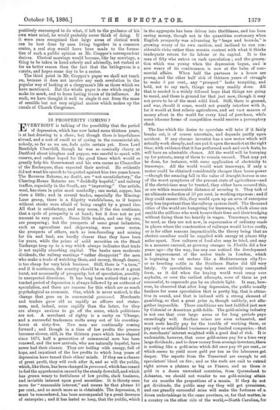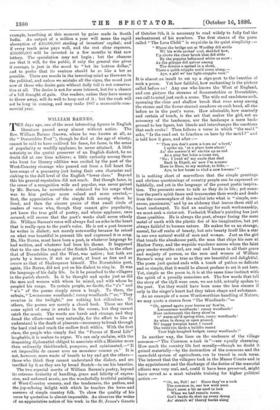ISPROSPERITY COMING P
EVERYBODY is talking of the possibility that the period of depression, which has now lasted some thirteen years, is at last drawing to a close ; but though there is hopefulness abroad, and a sort of smell as of spring in the commercial air, nobody, so far as we see, feels quite certain yet. Even Lord Randolph Churchill, though he was so comically cheery at Dartford about isinglass and pepper, was careful to speak with reserve, and rather hoped for the good times which would so greatly help his Government and his own career as Chancellor of the Exchequer, than expected their arrival. He evidently did not want his speech to be quoted against him two years hence. The Revenue Returns, no doubt, are "not unsatisfactory," the Clearing-House Returns are "decidedly hopeful," and railway traffics, especially in the South, are "improving." One article, wool, has risen in price most markedly ; one metal, copper, has risen a little ; and in several trades, especially the Mincing. Lane group, there is a fidgetty watchfulness, as if buyers without stocks were afraid of being caught by a grand rise. All that is satisfactory, and may mean, if the rise continues, that a cycle of prosperity is at hand ; but it does not as yet amount to very much. Some little trades, and one big one, are prospering ; but the prospects of some great industries, such as agriculture and shipowning, were never worse, the prospects of others, such as iron-founding and mining for tin and lead, are hardly clearer than they have been for years, while the prices of solid securities on the Stock Exchange keep up in a way which always indicates that trade is not rapidly absorbing capital. The banks earn moderate dividends, the railway earnings "rather disappoint" the men who make a trade of watching them, and money, though dearer, is too cheap for very brisk business. Still, there is "a turn," and if it continues, the country should be on the eve of a great burst, not necessarily of prosperity, but of speculation, possibly in unexpected directions. It has long been noticed that a pro- tracted period of depression is always followed by an outburst of speculation, and there are reasons for this which are as much psychological as economic. One, which is never noticed, is the change that goes on in commercial personnel. Merchants and traders grow old as rapidly as officers and states- men, and, indeed, more rapidly than the latter, for they are always anxious to go off the scene, which politicians are not. A merchant of eighty is a rarity on 'Change, and a successful tradesman melts away out of his counting- house at sixty-five. New men are continually coming forward ; and though in a time of low profits the process becomes slower, still, in the thirteen years which have elapsed since 1873, half a generation of commercial men has been renewed, and the new arrivals, who are naturally hopeful, have never had their chance. They are boiling with energy, full of hope, and impatient of the low profits to which long years of depression have tamed their elders' minds. If they see a chance of great profit, they will rash after it, and so will the public, which, like them, has been changed in personnel, which has ceased to feel the apprehension caused by the steady downfall, and which has grown weary to fretfulness of low profits, slack business, and invisible interest upon good securities. It is thirsty once more for "reasonable interest," and means by that phrase 10 per cent., and as much more as is obtainable. The depression, it must be remembered, has been accompanied by a great decrease of enterprise ; and it has lasted so long, that the public, which
in the aggregate has been driven into thriftiness, and has been saving money, though not in the quantities customary when English prosperity was advancing by "leaps and bounds," is growing weary of its own caution, and inclined to run con- siderable risks rather than remain content with what it thinks inadequate return for its labour or its capital. It is the man of fifty who enters on rash speculation ; and the genera- tion which was young when the depression began, and is now weary of its continuance, is now at the helm of com- mercial affairs. When half the partners in a house are young, and the other half sick of thirteen years of struggle to make 3 per cent., any "prospect" looks tempting, and bold, not to say rash, things are very readily done. All that is needed is a widely diffused hope that things are going to mend, and there is ground for that just now, though it may not prove to be of the most solid kind. Still, there is ground, and war, should it come, would not greatly interfere with it, for it would at first relieve agriculture, and set vast masses of money afloat in the world for every kind of purchase, while some irksome forms of competition would receive a peremptory check.
The line which the desire to speculate will take if it fairly breaks out, is of course uncertain, and depends partly upon accident. If any obscure inventor has a new motor which will actually work cheaply, and can put it upon the market at the right time, with evidence that it has performed such and such feats, he will have an admirable chance. All the world will be hurrying up for patents, many of them to remain unused. That may yet be done, for instance, with some application of electricity to tramways. All the world would want tramways, if only a motor could be obtained considerably cheaper than horse-power —though the amazing fall in the value of draught-horses is one of the worst symptoms of the present state of agriculture—and if the electricians may be trusted, they either have secured this, or are within measurable distance of securing it. They talk of an ultimate reduction of 50 per cent. in working expenses ; and if they could ensure this, they would open up an area of enterprise only less important than the railway system itself. The thousand cities of the world are hungering for tramways, which alone can
enable the millions who work to save their time and their trudging without fining them too heavily in wages. Tramways, too, may be used, as they are not now, in supercesaion of ordinary roads in places where the construction of railways would be too costly, or is for other reasons impracticable, the theory being that an electric omnibus could be supplied with energy at places fifty miles apart. New cultures of food also may be tried, and may in a measure succeed, as growing oranges in Florida did a few years ago—(by the way, has any one noticed the development and improvement of the melon trade in London, which is beginning to eat melons like a Mediterranean city P)— or as breeding cattle in the Southern States did till very lately. Or speculation may take some entirely unexpected form, as it did when the buying world went crazy over asphalte, or over the earliest attempts, none of them as yet successful, to supersede gas by an electric light. It may, how- ever, be observed that after long depression, the public usually , hankers for some speculation that is pretty big, that is attrac- tive in sound, and that is imbued with a strong element of gambling, so that a great prize is, though unlikely, not alto- gether impossible. Those conditions are best fulfilled just now by Colonial or American gold-fields. The gold-mining industry is not one that over large areas or for long periods pays exceedingly well. Surface mines are soon exhausted, and most reefs hardly pay for the trouble of working them, or pay only as established businesses pay limited companies,—that is, merchants' interest weighted with a good deal of risk. It is undeniable, however, that some gold-mines pay for a time very large dividends ; and to draw money from average investors, there is nothing like a gold-mine which did once pay 68 per cent., or which seems to yield more gold per ton as the labourers get deeper. The reports from the Transvaal are enough. to set speculators' blood on fire ; and as the reefs are said to extend. right across a plateau as big as France, and as there is gold in a dozen unworked countries, from Queensland- to Ashantee, we should not wonder to see gold-mining attain for six months the proportions of a. mania. If they do not get dividends, the public may say they will get premium, and one grandly successful mine will make the fortunes of.a dozen undertakings in the same province, or, for that matter, in a country on the other side of the world,—North Carolina, for
example, benefiting at this moment by gains made in South India. An output of a million a year will mean the rapid absorption of £20,000,000 sterling of investors' capital; and if every tenth mine pays well, and the rest clear expenses, L50,000,000 will be invested in a few months in that new lottery. The speculation may not begin ; but the chances are that it will, for the public, if only the general rise gives it courage, is just in the mood to "bet its bottom dollar," and to prefer that its venture should be as like a bet as possible. There are moods in the investing mind as there are in the political, and unless we mistake all the signs, the mood just now of those who desire gain without daily toil is not conserva- tive at all. The desire is not for mere interest, but for a chance of a full draught of gain. Our readers, unless they have money to throw away, will do well to keep out of it ; but the rush will not be long in coming, and may make 1887 a memorable com- mercial year.



































 Previous page
Previous page